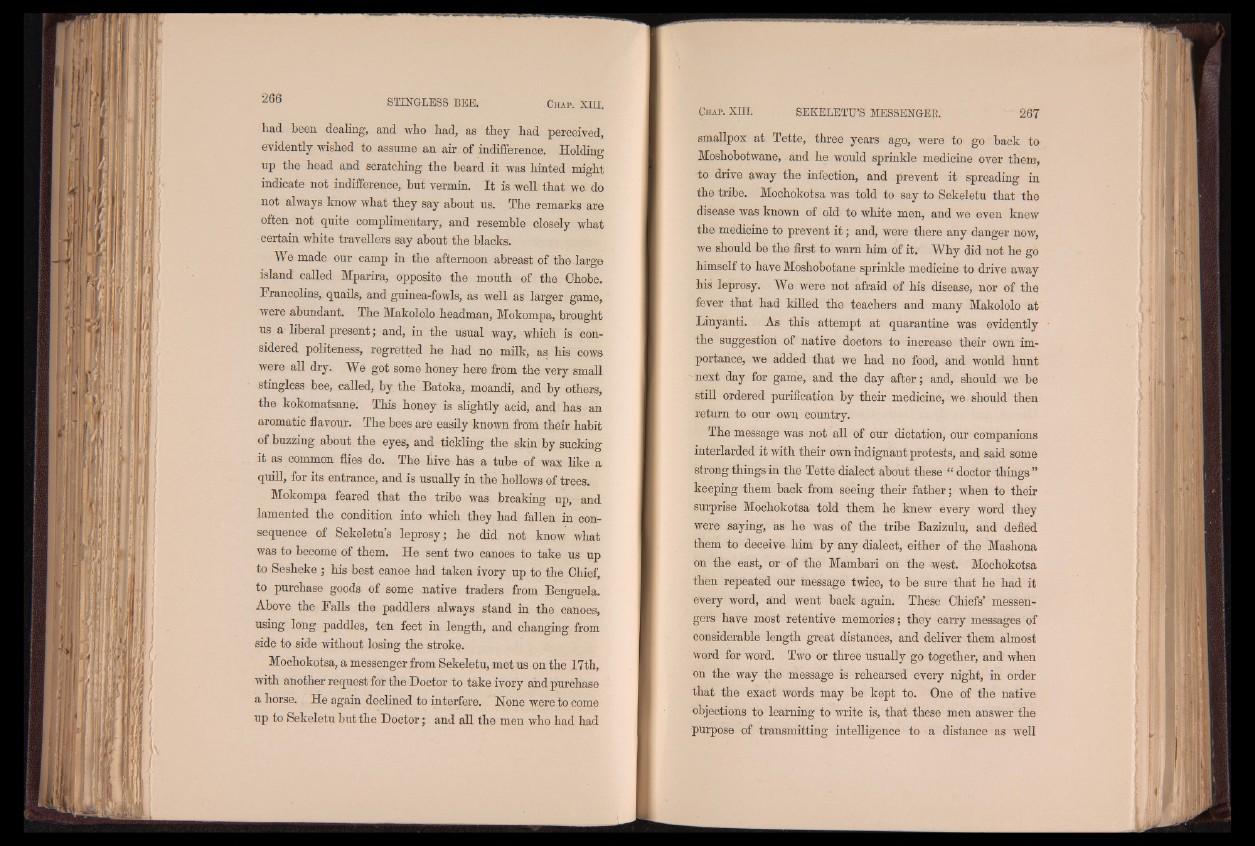
had been dealing, and who had, as they had perceived,
evidently wished to assume an air of indifference. Holding
up the head and scratching the beard it was hinted might
indicate not indifference, hut vermin. I t is well that we do
not always know what they say about us. The remarks are
often not quite complimentary, and resemble closely what
certain white travellers say about the blacks.
We made our camp in the afternoon abreast of the large
island called Mparira, opposite the mouth of the Ohobe.
Francolins, quails, and guinea-fowls, as well as larger game,
were abundant. The Makololo headman, Mokompa, brought
us a liberal present; and, in the usual way, which is considered
politeness, regretted he had no milk, as his cows
were all dry. We got some honey here from the very small
stingless bee, called, by the Batoka, moandi, and by others,
the kokomatsane. This honey is slightly acid, and has an
aromatic flavour. The bees are easily known from their habit
of buzzing about the eyes, and tickling the skin by sucking
it as common flies do. The hive has a tube of wax like a
quill, for its entrance, and is usually in the hollows of trees.
Mokompa feared that the tribe was breaking up, and
lamented the condition into which they had fallen in consequence
of Sekeletu’s leprosy; he did not know what
was to become of them. He sent two canoes to take us up
to Sesheke ; his best canoe had taken ivory up to the Chief,
to purchase goods of some native traders from Benguela.
Above the Falls the paddlers always stand in the canoes,
using long paddles, ten feet in length, and changing from
side to side without losing the stroke.
Mochokotsa, a messenger from Sekeletu, met us on the 17th,
with another request for the Doctor to take ivory and purchase
a horse. He again declined to interfere. None were to come
up to Sekeletu but the Doctor; and all the men who had had
smallpox at Tette, three years ago, were to go back to
Moshobotwane, and he would sprinkle medicine over them,
to drive away the infection, and prevent it spreading in
the tribe. Mochokotsa was told to say to Sekeletu that the
disease was known of old to white men, and we even knew
the medicine to prevent i t ; and, were there any danger now,
we should be the first to warn him of it. Why did not he go
himself to have Moshobotane sprinkle medicine to drive away
his leprosy. We were not afraid of his disease, nor of the
fever that had killed the teachers and many Makololo at
Linyanti. As this attempt at quarantine was evidently
the suggestion of native doctors to increase their own importance,
we added that we had no food, and would hunt
- next day for game, and the day after; and, should we be
still ordered purification by their medicine, we should then
return to our own country.
The message was not all of our dictation, our companions
interlarded it with their own indignant protests, and said some
strong things in the Tette dialect about these I doctor things ”
keeping them back from seeing their father; when to their
surprise Mochokotsa told them he knew every word they
were saying, as he was of the tribe Bazizulu, and defied
them to deceive him by any dialect, either of the Mashona
on the east, or of the Mambari on the west. Mochokotsa
then repeated our message twice, to be sure that he had it
every word, and went back again. These Chiefs’ messengers
have most retentive memories; they carry messages of
considerable length great distances, and deliver them almost
word for word. Two or three usually go together, and when
on the way the message is rehearsed every night, in order
that the exact words may be kept to. One of the native
objections to learning to write is, that these men answer the
purpose of transmitting intelligence to a distance as well